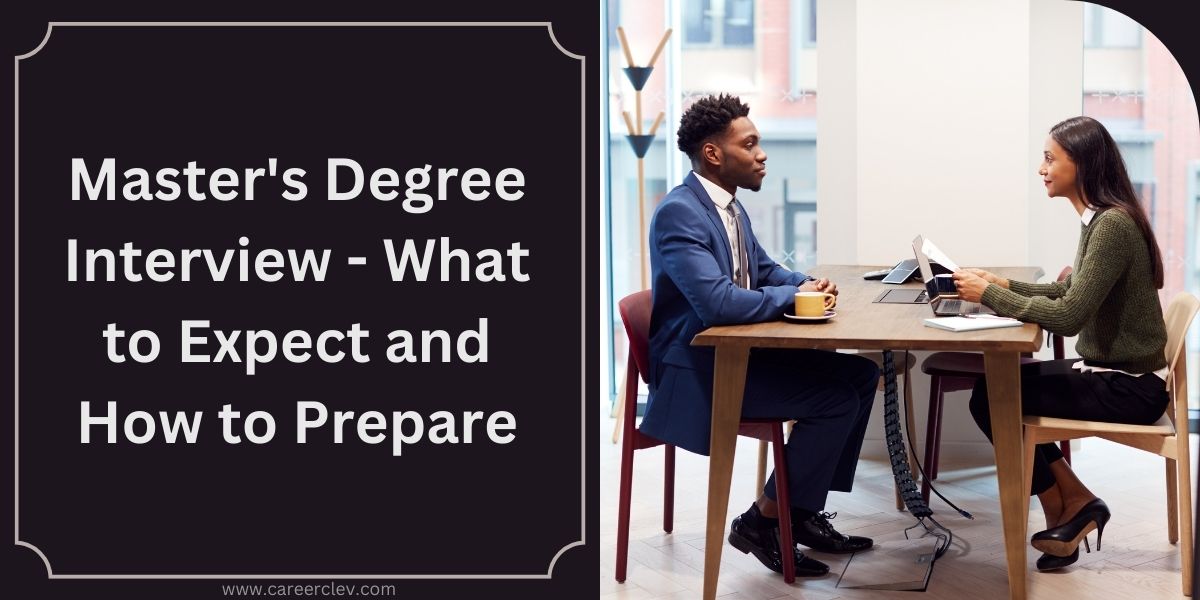As part of the postgraduate registration process, not all necessitate a Master’s degree interview. However, some courses, like MBAs, most often meet with candidates before making offers of admission.
This page provides insight into the types of Master’s interview questions you may be asked, as well as what to expect during your interview and how to prepare.
We’ve also recommended some questions to ask during a postgraduate interview.
Some Interview Questions for Master’s Degree
During your Master’s degree interview, you will most likely be asked about your intellectual pursuits and why you wish to pursue a Master’s degree.
Here are a few examples of common questions you will encounter:
Q: 1. Can you tell us a little bit about yourself?
There’s no need to tell interviewers your biographies, but use this inquiry to provide some basic information, like where you studied as a bachelor and what your primary hobbies are.
Q: 2. Why did you choose this specific course?
If you gain access to an interview, it’s likely that your potential school believes you have the practical or intellectual chance to execute a Master’s program.
Above all, you must demonstrate that you have the ambition and desire to go through with it competently.
What are the types of questions to ask During a Master’s Degree Interview?
Once you finish a master’s degree interview, the admissions officer will most likely ask if you still have any questions for them. It really is a smart option to have some of these on hand.
Q: 1. What extracurricular activities does this course provide?
Bringing this up allows you to learn about the opportunities for students to participate in traineeships and internships during their Master’s program.
Q: 2. Where do students go after completing this Master’s degree?
This can be a good way to discover more about the program’s employment options and how many students go on to Ph.D. studies.
Q: 3. Is it possible to study abroad?
You may even be able to do a placement at a partner institution or go on a research trip.
What are the Types of Master’s Degree interviews?
Depending on the institution and subject you want to study, master’s degree interviews can take a variety of forms.
When you go for an interview, you may receive a tour of the department or be given a demonstration to provide you with an extensive explanation of the coursework and services available.
The following are some examples of common postgraduate interview formats:
An official interview
An official interview follows the same style as a job interview. You may have this interview with a single tutor or with a panel of tutors.
You’ll most likely encounter several questions about your decision to pursue postgraduate studies, like why you chose this school and what you wish to receive from a Master’s degree.
A casual conversation
You may need to have a more open conversation with a potential tutor. This may occur in their office, a café, or another campus venue.
No matter how relaxed your interview is, it is critical that you are well organized. The questions you’ll be asked may be less strict, but you’ll still be expected to show interest in your program and university, as well as clarify why you’ve preferred them.
An interview on video
Sometimes, getting to your potential school may be difficult. This could be the scenario if you are an international student applying to study overseas.
In these cases, some institutions provide remote interviews via Zoom, Microsoft Teams, Skype, or other video-conferencing software.
These methods, like face-to-face interviews, can be conducted by a single interviewer or a panel.
A presentation
If you apply for a research Master’s degree (such as an MPhil or MRes), you may have to share a PowerPoint speech.
Typically, this will entail clearly detailing your research proposal and discussing your intended methodology.
How to Get Ready for a Master’s Degree Interview
Getting ready for a master’s degree interview does not have to be tiring or time-consuming. The following are some basic steps to take:
1. Learn everything you can about your course.
If you show up at your interview with no insight into your prospective course, you are unlikely to come across as an enthusiastic, passionate candidate. Read about your training course to leave an impression.
Begin by reading the course descriptions on the web, but don’t stop there. Examine the faculty’s webpage carefully and read thoroughly about the various modules on offer.
2. Read up carefully, research in your field of interest.
What greater way to motivate interviewers than to demonstrate that you are up to date on the most recent studies in your area of study?
This is essential for Ph.D. interviews but can also be useful for Master’s courses, especially if you’re applying for an MRes or MPhil.
You must have a solid understanding of the current state of research in your field, especially if your Master’s will require you to conduct your own research.
3. Examine your previous work.
You will almost certainly be asked to discuss the aspects of your subject in which you are particularly interested.
However, it’s possible that you haven’t written up some of your undergraduate assignments in a long time.
Reading through your previous academic work will refresh your memory of the various topics you studied during your Bachelor’s degree as well as provide specific examples of research and work you enjoyed carrying out.
4. Make a list of questions.
Interviewers will be eager to ask you questions, but they will also give you the opportunity to ask your own.
There’s no need to make up questions just for the sake of it; use this time to ensure you understand what the program has to offer.
Don’t be afraid to ask any questions you have about the course, from contact hours to what previous students have done.
What Should You Bring to a Master’s Interview?
When it comes to attire, you should approach a Master’s degree interview in the same way you would a job interview.
There is usually no strict dress code once you start a postgraduate course, but you should try to make a good first impression by arriving for your interview in clean and smart clothes.
This applies to all interviews, including those conducted via Skype.
You may want to take notes on any feedback or general course information provided by your interviewer, so bring a notepad and a few pens.
You should also bring a copy of some of your previous work, especially if you want to discuss it with your interviewer.
Conclusion
If you are required to submit any work prior to your interview, make sure to bring a hard copy of it with you. It’s likely that your interviewer will want to talk about it with you.
At the end of the day, being prepared doesn’t hurt. It’s worth having options on hand if you can


 Jobi.ng
Jobi.ng



